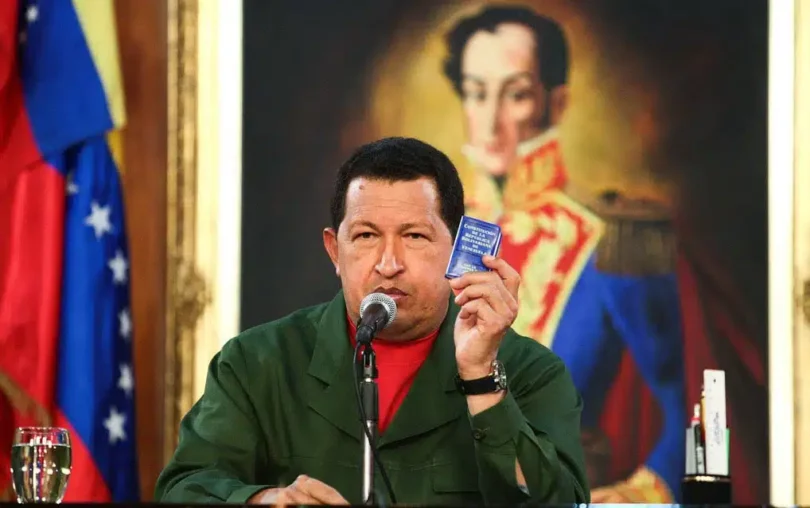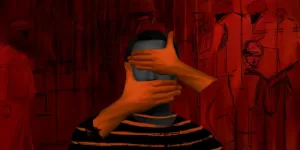Objectively reviewing the history of our times proves that Chávez faced—and Maduro has continued to face—all the strategies, tactics, maneuvers, games, and schemes that the U.S. empire and its satellites and lackeys have successfully used throughout the rest of the continent, among other ploys that have been used in other parts of the world.
Let’s conduct a thorough count from memory: coups d’état, military riots, public uprisings by high-ranking military officers, strikes and sabotages of the productive industrial apparatus, denunciations of electoral fraud with violent protests, interference through the Organization of American States, internal economic warfare, attacks on the national currency, parliamentary coups, unilateral coercive measures, economic blockades, lawfare, international judicial persecution, migration crises, and arbitrary appointments of so-called parallel authorities—all of this combined with constant and persistent harassment by international and opposing national media.
Let us compare, then: Manuel Zelaya, Fernando Lugo, and even Evo Morales were deposed by political elites supported by military traitors. Chávez was also overthrown, but it lasted only 47 hours. Meanwhile, the most famous military coup attempt against Nicolás Maduro was somewhat of a meme, consisting of the takeover of a traffic control point and some green bananas in a plastic bag.
Dilma Rousseff was removed from power by judicial maneuvers. Luiz Inácio Lula Da Silva was prevented from returning to the presidency in 2018 with similar tricks. Rafael Correa has been kept out of Ecuadorian political life to this day in the same way. Recently, judges serving the Argentinian right wing removed Cristina Fernández, favorited to win the next elections, from the race; and the perverse Congress of Peru managed, after more than a year, to make Pedro Castillo take a false step, vacating his position and facing imprisonment. In Venezuela, however, all these judicial maneuvers have suffered resounding defeats.
Why have these actions, designed in the laboratories of destabilization, carried out under the direction of governments that have centuries of experience in this field, functioned in other countries and not in Venezuela? It is interesting to reflect on this and draw some deductions.
Changing the constitution
The first factor to consider in this analysis should be the strategic vision that Chávez and his collaborators and advisors adopted at the end of the 90s, when they prioritized the modification of the country’s constitution through a process in which the people would have the last say.
Had the convening of a National Constituent Assembly not been Chávez’s first decree, if he had resigned himself to governing under the Constitution of 1961, it is very likely that he would have suffered a similar fate as Castillo, facing impossible obstacles to carrying out the reforms expected by the electorate and a perpetual political conflict that would have ended with his expulsion from Miraflores or, in the best case, with a brief five-year term of office.
If anyone doubts the possibility of this fate, one has only to remember that the leaders of Acción Democrática and COPEI [Social Christian Party], were capable of ousting one of their own, Carlos Andrés Pérez, in 1993, by means of a process that today could be described as lawfare, performing this overthrow through the Supreme Court of Justice and the Congress, institutions that were completely dominated by those two parties. If they did that to Pérez, what would they not have done to Chávez?
Modifying the constitutional order allowed the Bolivarian Revolution to armor itself against the typical conspiracies of the recently displaced elites and to respond in critical situations that have been springing up since early days of the revolution.
In that initial phase, the power of the old leadership had not been completely abolished, as was demonstrated in the Supreme Court’s ruling on the “generals with good intentions,” which prevented the punishment that the perpetrators of the April 2002 coup deserved.
The new structure, comprised of five branches of the State, which also included the Constitutional Chamber of the Supreme Court of Justice, played a decisive role much later on to prevent the consummation of parliamentary coup attempts in the 2016-2021 period, when the opposition held the majority in the National Assembly and tried to carry out a strategy of direct confrontation with the government.
The popular base of support
A key element in this history of resistance has been the support of the people for the movement led by Chávez: the popular support for his constitutional initiative, and the progressive policies that he was able to develop that President Maduro has tried to continue.
Without this popular support, the imperialist forces and the domestic right wing would have long ago achieved their goal of destroying the Venezuelan revolutionary process.
The popular base has asserted their presence through voting (in elections and referendums) as well as through mobilizing in crucial moments, when mass action was necessary to respond to each of the adversaries’ schemes. The absence of this compelling response from the people has been decisive in several of the overthrows of other Latin American presidents, who lacked this support base.
The strength of the leadership
Chávez managed to avoid almost all conspiracies, although there remains some doubt regarding the possibility that the disease that took his life may have been induced. His success in the face of the attacks from the right could largely be attributed to the extraordinary strength of his leadership, which began in the national arena as the product of an impactful event (the military insurrection of 1992) which he managed to cast internationally and into the annals of history.
The deep roots of that leadership defeated many of the conspiracies aimed at removing him from the revolutionary path, among which the coup of April 2002 and the oil strike-sabotage during the end of that same year and the beginning of the following year stand out.
In the final days of his life, Chávez made a great effort to defend his leadership by clearly outlining the roadmap for succession.
Despite not having the same strength and charisma that characterized Chávez’s presidency, Maduro has battled intensely, using the tools he acquired from the Commander, one of which was the administration of diplomacy. In a repeat of what happened with Chávez, Maduro’s endurance through multiple conspiracies has only made him stronger. And that strength, without a doubt, has been fundamental in critical moments.
The civic-military alliance
In its large arsenal of options for overthrowing “disobedient” governments, the United States has never ruled out the military coup. In fact, proclamations made by the armed forces continued to have influence (both de facto and symbolic) even while delivering the decisive blow to leftist presidencies in different countries of the region, as was observed in Venezuela on April 11, 2002; in Bolivia, in 2019; and in Peru a few days ago.
That is why reforming the role of the Bolivarian National Armed Force (FANB) in the political scenario has been crucial. By dismantling the structure of the Fourth Republic and reworking the military doctrine, the Bolivarian Revolution reduced the pernicious influence of the School of the Americas, which was the tool through which the United States used to impose dictatorial governments or U.S.-controlled democracies throughout the region.
In the path toward achieving that goal, Chávez had the advantage of being a leader of military origin, but, going beyond that, he had also learned from the mistakes and betrayals that he had to endure.
Maduro, since then, has maintained the central aspects of that new doctrine successfully, proven by his ability to seamlessly overcome the coup attempt of April 2019, characterized by the right wing’s unsuccessful attempts to involve the military high command as later revealed by unofficial spokespersons of the United States.
The clumsiness of the opposition
A review of the Venezuelan resistance to “regime change” attempts cannot be complete without considering the opposition’s proverbial incompetence. The opposition has had many advantageous opportunities, with almost unanimous support from the conglomerate of global capitalism, and yet has failed to realize their goal of destroying the revolution.
It seems evident that the respective oppositions of Honduras, Paraguay, Ecuador, Brazil, Bolivia, Argentina, and Peru are less clumsy, although equally questionable. They have had a greater capacity to maintain positions of power within the government itself, in the deliberative bodies, in the military institutions, and in the judiciary, which has allowed them to carry out their maneuvers for overthrowing their governments with some semblance of legitimacy.
The media factor
Of course, the media factor cannot be left out of any analysis about why the insidiousness and schemes of the imperialist right wing have worked in other countries and not in Venezuela.
The fact that the Venezuelan revolution has fought the media war and, after many lost battles, ended up coming out on top against such a powerful enemy carries particular relevance.
The media machinery is irreplaceable in traditional coup, parliamentary coup, lawfare, or foreign intervention operations. The media, acting under shared editorial guidelines, undermine leftist leaderships, mount smear campaigns, accuse without evidence, spread false news, magnify mistakes, and hide achievements; that is to say, they contribute to creating an adverse climate for the government in which any of the maneuvers mentioned above becomes much more viable.
A media apparatus collaborating with imperialism created the conditions for the bloody military coup against Salvador Allende in 1973. The same thing happened in Venezuela in 2002, when the coup against Chávez was carried out more by the media than by the military.
The Venezuelan experience indicates that winning the internal media war is fundamental though not enough, since the media machinery of hegemonic capitalism is now as global as the system itself and has the capacity to replace the discredited national media.
In the terrible years that Venezuelans have endured since the death of Comandante Chávez, it has been that external apparatus (U.S., Latin American, and European media allied with the erroneously titled Venezuelan “free press,” financed by foreign governments) that has tried to set the stage to overthrow Nicolás Maduro. To this end, it has legitimized widespread violence in the streets and attempts at invasion, assassination, and coup d’état.
Consequently, the defeat of all these plots also represents the failure of the media machinery. It is no coincidence that, on the other hand, in all the sister nations where “regime changes” have taken place, the mass media continue to be shameless instruments of the economic elites and the political right wing.
Without being jingoistic, all of the above seem to be compelling lessons to take from the experience of this besieged, extorted, and blockaded Venezuela for the rest of Our America and the Global South: an example that is worth reiterating and grows larger with each overthrow, removal, disqualification, dismissal, or murder of left-wing presidents or candidates.
(Courtesy: Orinoco Tribune, an independent news outlet created in 2018 and specially designed to provide relevant progressive information about Venezuela or related to Venezuela.)




